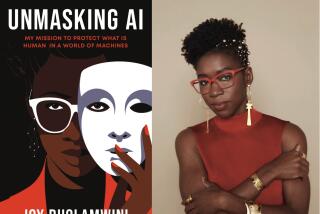Scientist Says She Can’t Crack the Clipper Chip
- Share via
WASHINGTON — Dorothy Denning keeps a small sign on the shelf above her desk at Georgetown University: “Keep Smiling--It Makes People Wonder What You’ve Been Up To.”
Right now, Denning is smiling.
Denning, a circumspect computer scientist, is staking her reputation on the integrity of a secret electronic code that millions of Americans are being asked to adopt as a way to protect their most private telephone conversations, faxes, computer files and electronic mail.
She is head of Georgetown’s computer science department, a nationally recognized authority on ciphers, and one of five independent experts invited by the government to scrutinize the inner workings of the controversial code designed by the National Security Agency. Six experts turned down the government’s invitation, in large part because of longstanding hostility between independent cryptographers and the intelligence agency.
Since last spring, Denning has been commuting between her Washington office and the NSA’s high-security enclave outside Baltimore, where she has done her best to break what the government’s most gifted cryptographers have constructed by attacking it billions of times from her computer workstation.
She is pleased to say she failed.
She says the electronic code will keep any secret safe for at least 30 years, perhaps for as long as a billion years--or until a government agent obtains the necessary court order authorizing the release of the keys that unlock the code.
Denning says her only concern is to determine the mathematical integrity of the classified code and the legal integrity of the system that will safeguard its electronic keys.
But in the sometimes acrimonious debate over codes and the new wiretapping technology, Denning has become an unofficial figurehead for the NSA, an agency responsible for conducting much of the country’s electronic surveillance and which is more comfortable conducting its affairs in secrecy.
She brings an unusual credibility to that role because she has been an important opponent of other government efforts to police the electronic frontier.
In 1990, Denning was a key defense witness against the government in a well-publicized computer case in which federal prosecutors attempted to send a 20-year-old college student to jail for 65 years because he published a purloined telephone company document in an electronic newsletter called Phrack. The government dropped the case days after she informally laid out her proposed testimony to prosecutors.
She easily demonstrated that the information in the stolen document could not have been used to break into telephone systems and disrupt service, effectively demolishing the foundation of the prosecution’s case.
She believes that the proposed electronic code, called Skipjack, strikes a balance between the needs of personal privacy and the need of law enforcement to wiretap telephones and other scrambled communications.
“All of a sudden, the social consciousness really hit me,” she said. “I really feel the need to make sure the technology is used responsibly, to make sure that in our zeal for privacy, we don’t cause a major problem.
“I find myself more and more in accord with what the NSA, the FBI, the Justice Department is trying to accomplish,” she said. “Ten years ago, I never would have thought I would be saying that. I was raised to have no trust of the NSA and a certain amount of distrust of the FBI.
“I would not be behind this if I thought it was going to compromise privacy,” she said. “It is going to be virtually impossible for anyone to illicitly tap a conversation, and law enforcement will have no way to wiretap without a court order.”
Nonetheless, her endorsement of the government’s electronic code book has brought scorn from the computer hackers she once defended. Some routinely refer to her as the “Wicked Witch of the East” in their computer postings.
“People have suggested my books should be boycotted. My credentials were questioned. They say I am a dupe,” she said. “The favorite thing they like to say is that ‘she’s well-intentioned but naive.’ ”
Denning had planned to become a high school math teacher, but she got interested in computer security while taking a seminar on operating systems as a doctoral student at Purdue University. She later married the professor who taught the class.
In the years that followed, she literally wrote the book on modern cryptography.
“Mathematically, it’s very elegant,” she said. “Here you can take something and scramble it up so no one can get at it without a key.”
More to Read
Sign up for Essential California
The most important California stories and recommendations in your inbox every morning.
You may occasionally receive promotional content from the Los Angeles Times.













